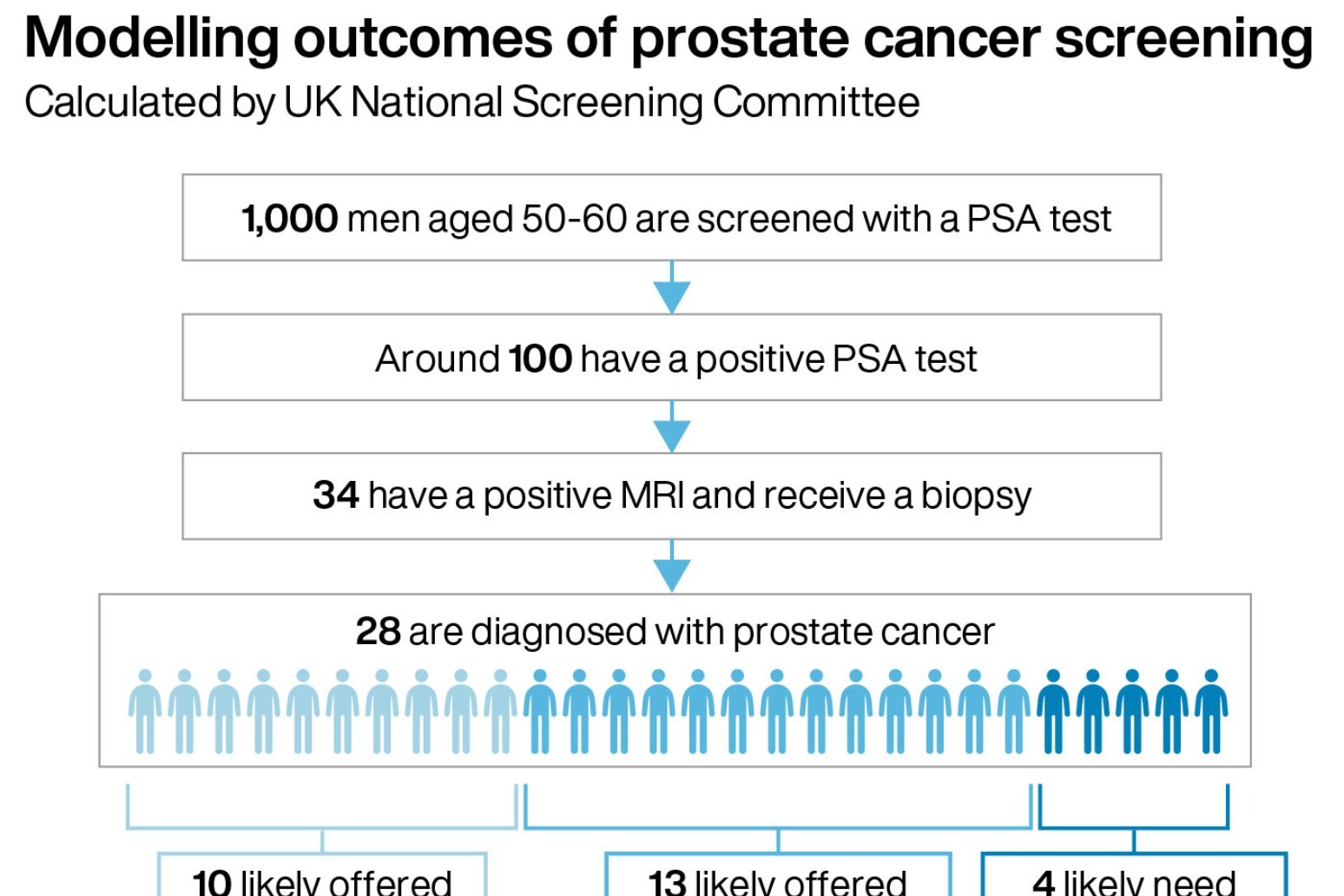Listeners:
Top listeners:
-
 play_arrow
play_arrow
Rother Radio (128K) Love Local, Love Music!
-
 play_arrow
play_arrow
Rother Radio (64K) Love Local, Love Music!
-
 play_arrow
play_arrow
Rother Radio (South Yorkshire) (64K) Love Local, Love Music!
-
 play_arrow
play_arrow
Rother Radio (South Yorkshire) (128K) Love Local, Love Music!
-
 play_arrow
play_arrow
Rother Radio (Doncaster) (64K) Love Local, Love Music!
-
 play_arrow
play_arrow
Rother Radio (Doncaster) (128K) Love Local, Love Music!
-
 play_arrow
play_arrow
Rother Radio Xmas Love Local, Love Music!
-
 play_arrow
play_arrow
Rother Radio – Special Announcement Love Local, Love Music!

Committee says no to testing all men
Prostate cancer screening should not be made routinely available for the vast majority of men in the UK, a committee advising the Government has said.
In a draft recommendation, the UK National Screening Committee (UKNSC) said it would not recommend population screening using the prostate specific antigen (PSA) test because it “is likely to cause more harm than good”.
Experts are waiting to see data from a large trial launched by Prostate Cancer UK last week into whether combining PSA with other tests, such as rapid MRI scans, could lead to a recommendation for population-wide screening.
For now, the committee will put forward only a recommendation to screen men with BRCA1 and BRCA2 genetic mutations – which puts them at far higher risk of prostate cancer – every two years, between the ages of 45 and 61.
Health Secretary Wes Streeting said he would consider the findings, adding that he wanted to see earlier diagnosis and quicker treatment, but that needed to be balanced against “the harms that wider screening could cause to men”.
Professor Sir Mike Richards, a former national cancer director and chairman of the UKNSC, told a briefing that modelling on PSA shows that “whole population screening may lead to a small reduction in prostate cancer deaths, but the very high levels of overdiagnosis” means harms outweigh the benefits.
Many experts argue the PSA test is not very reliable because men with a high PSA level may not have cancer and some men with cancer have a normal PSA result.
A positive test result may lead to unnecessary treatment for slow-growing or harmless tumours, leaving men at risk of side effects such as incontinence and erectile dysfunction, they add.
The UKNSC said on Friday it would also not recommend extensive prostate cancer screening for black men – who are at double the risk of the disease – because of a current lack of data and evidence for this group.
The committee also does not recommend targeted screening for men with a family history of the disease, who are also at higher risk of prostate cancer.
The UKNSC said it will work closely with the Transform trial launched last week by Prostate Cancer UK to gather more data in these areas.
This trial is looking at the most promising screening techniques available, including PSA blood tests, genetic tests and 10-minute MRI scans, and whether they can be combined for population-wide prostate screening.
It is hoped the results will be ready within two years.
Laura Kerby, chief executive of Prostate Cancer UK, said: “The committee’s decision will come as a blow to the tens of thousands of men, loved ones and families who’ve fought for a screening programme.
“Today we’re deeply disappointed, but as determined as ever, and it won’t slow us down.
“People are sick and tired of seeing the men they love harmed by this disease, and we won’t rest until no man’s diagnosis is left to chance.
“We know that a mass screening programme could save thousands of men’s lives.
“While screening men with BRCA gene variations will save only a fraction of that, the committee’s decision is the first time they’ve recommended screening of any kind for prostate cancer.
“It shows that research and evidence can shift the dial and save men’s lives.
“And the research programme that could achieve screening for all men is already under way – our £42 million Transform trial, which will bring new evidence back to the screening committee in just two years.”
Dr Ian Walker, executive director of policy at Cancer Research UK, said: “It’s good news that prostate cancer screening is being considered for men with faulty BRCA genes, which increase a man’s risk of developing an aggressive type of the disease.
“The UK National Screening Committee’s analysis shows that screening this group will save lives.
“We support the committee’s conclusion that for other groups of men, there isn’t currently enough high-quality evidence that screening would do more good than harm – it can miss dangerous cancers and detect ones that don’t need treatment.”
Mr Streeting said: “I have always said I want to see screening in place for the most common cancer in men, provided this is backed by evidence.
“I want to change the NHS so it diagnoses earlier and treats faster. That aim will be balanced against the harms that wider screening could cause to men.
“I will examine the evidence and arguments in this draft recommendation thoroughly, bringing together those with differing views, ahead of the final recommendation in March.”
He said the Government was providing funding to the Transform trial “which has the potential to revolutionise prostate cancer screening, cutting out harmful side-effects and making screening far more accurate.”
Around three in every 1,000 men have BRCA 1 and 2 mutations.
The UKNSC said it was working with the NHS on ways to find those men who may be carriers.
At present, men may become aware they have the fault when a woman in their family with breast cancer tests positive for BRCA.
Prof Richards said: “There are existing guidelines on who should get that (BRCA) testing and I think we will make those probably more prominent during the consultation process.”
He said men with a strong family history of prostate cancer can still get a PSA test via their GP, but more data is still needed for widespread testing, and for widespread screening for black men.
The charity Prostate Cancer Research said the recommendation was a “missed opportunity” and the “historical harms” associated with screening (such as unnecessary biopsies) have been dramatically reduced by modern “MRI-first techniques”.
Its chief executive Oliver Kemp said: “Today’s decision to recommend screening to BRCA variant carriers does not go far enough.
“It is a missed opportunity for other high-risk groups, including black men and men with family history.
“We are failing these groups and entrenching inequalities further by not providing them with the best chance of having their disease caught early – when they are more likely to survive.
“There is still time for the Government to reconsider this decision for all high-risk men, as further delays will continue to condemn the lives of thousands more.”
Figures published by the UKNSC suggest around 80% of men whose prostate cancers are identified through PSA screening “would not benefit in terms of preventing prostate cancer deaths and (advanced disease)”.
Ros Eeles, professor of oncogenetics at the Institute of Cancer Research (ICR), London, said screening men with BRCA mutations would save lives.
But she said the ICR recommends yearly screening rather than every two years.
She added: “Men with the BRCA1 gene fault are more than three times as likely, compared with non-carriers, to have aggressive prostate cancers that are likely to grow and spread quickly…
“The risk of prostate cancer in BRCA2 carriers is more than doubled, as is the risk of aggressive prostate cancer, and they will develop prostate cancer at a younger age, on average.
“If you stop screening at 61 years of age, you miss nearly half of all cancers for BRCA carriers between 40 and 69 years.”
Published: by Radio NewsHub
Written by: Radio News Hub
Similar posts
Now Playing
Now playing: -
On Air Now

Wayne Cubitt
The Drive Home
Join Wayne for The Drive Home playing the greatest mix of music and keeping you up to date with the latest on the roads, public transport and more.
closeSponsored
Weather
Upcoming Local Event
Latest from Facebook
Search Rother Radio
Contact Us
- https://www.rotherradio.co.uk
- 01709 257 175
- studio@rotherradio.co.uk
About Us
Rother Radio – Love Local, Love Music! → Discover more
Our Partners
Rother Radio is owned by Rotherham Broadcasting CIC








